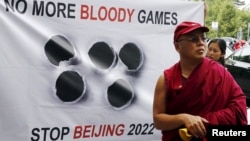Watchdog groups criticized the human rights records of China and Kazakhstan on Thursday, just over a week before the IOC decides on whether to award the 2022 Winter Olympics to Beijing or Almaty.
Human Rights Watch said in a statement that the IOC, which will vote in Kuala Lumpur, Malaysia, on July 31, should ensure that the host city “fully respect” human rights commitments in both preparing for and hosting the Winter Games.
“Whether China or Kazakhstan wins the honor... the IOC will face an extreme test of its new commitment to improve human rights protections,” Minky Worden, Human Rights Watch director of Global Initiatives, said. “The International Olympic Committee should insist that the host country rigorously comply with the Olympic Charter and basic human rights rules - or risk losing the right to host the games.”
Four groups opposing a bid by Beijing, which is attempting to become the first city to host both a Summer and Winter Olympics, wrote an open letter to the International Olympic Committee.
“As Tibetans, Uighurs, southern Mongolians and Han Chinese we join together to urge you... not to award another Olympic Games to China,” the letter said. “All of the people we represent have suffered as a result of the Chinese government's contempt for human rights. We hope that you are aware by now that the 2008 Beijing Games did nothing to alleviate human rights abuses in China or enhance freedom.”
Tibet says it is an independent nation, but the Chinese government insists it is part of China. Beijing staged a crackdown on Tibetan protests ahead of the 2008 Summer Games.
Uighurs are part of a Muslim minority in the far western region of Xinjiang. More than 6 million Mongolians live in China amid ethnic tensions.
Pro-Tibetan and other human rights groups have argued that the communist government's restrictions on civil and political liberties make Beijing an unfit candidate to host the games.
Meanwhile, another statement from Human Rights Watch singled out the Almaty bid and criticized Kazakhstan's hostility toward gay people.
The group issued a 31-page report documenting violence and discrimination that lesbian, gay, bisexual and transgender people face in the Central Asian nation.
It said gay, lesbian, bisexual and transgender people in Kazakhstan live in “the climate of fear,” facing violence and discrimination. It called on the government there to take immediate steps to improve the situation.
Human Rights Watch in the past has also criticized Kazakhstan's restrictions on media, assembly, and association freedoms, as well as the detention of government critics.
Last year, Russia was criticized over its law against gay “propaganda” ahead of its hosting of the Winter Olympics in Sochi.
The IOC commission that evaluated the 2022 bids said it sought and received assurances from both countries that they would uphold new clauses in the Olympic Charter and host city contract dealing with non-discrimination, workers' rights and sexual orientation. At the same time, the IOC said it would “respect the laws of a sovereign state.”
The report said the panel received “written assurances” from China on human rights, including the right to demonstrate and media freedom to report on the games without restrictions on the Internet.





